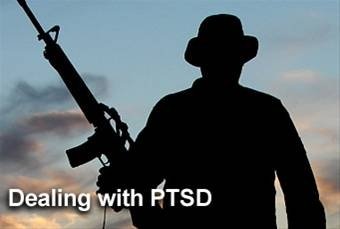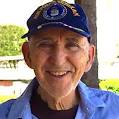 By Sherwood Ross, Staff Writer
By Sherwood Ross, Staff Writer
Veterans returning from the fighting in Afghanistan and Iraq are displaying many of the same post-traumatic stress disorder symptoms of troops that fought in Viet Nam, yet most do not seek treatment, authorities say.
“I’m not an alarmist but I think this is a serious problem,” Dr. Matthew Friedman, executive director of the Department of Veterans Affairs’ National Center for Post-Traumatic Stress Disorder(PTSD), wrote in The New England Journal of Medicine. Referring to a 2004 study of 6,201 returned service members that had been on active duty in Afghanistan and Iraq, Friedman said most “apparently were afraid to seek assistance for fear that a scarlet P would doom their careers.”
Although one in eight veterans reported PTSD, the survey showed that “less than half of those with problems sought help, mostly out of fear of being stigmatized or hurting their careers,” the Associated Press reported.
“Once called shell shock or combat fatigue, PTSD can develop after witnessing or experiencing a traumatic event. Symptoms include flashbacks, nightmares, feelings of detachment, irritability, trouble concentrating and sleeplessness,” AP said.
Symptoms of major depression, anxiety or PTSD were reported by about 16 to 17 percent of though who served in Iraq.
Findings by the National Vietnam Veterans Readjustment Survey showed 35.8 percent of male Vietnam combat veterans in the late 1980s suffered from PTSD at the time, almost 20 years after their war experience, said Dr. Jonathan Shay, a psychiatrist at the Department of Veterans Affairs Outpatient Clinic, Boston.
In an article in The Long Term View, the magazine of the Massachusetts School of Law at Andover, Shay wrote that Vietnam combat veterans have been hospitalized for physical problems about six times more often than troops that did not fight in Vietnam and are three times more likely to have been “both homeless and vagrant” than their civilian counterparts.
Shay is a recipient of a John D. and Catherine T. MacArthur Foundation “genius” award for his work in this area.
“The supposedly traditional idea of honoring returning veterans ran afoul of deep divisions over the justice and wisdom of the war as a whole, making honor to the veterans seem an endorsement of the war policy,” Shay writes. Many veterans suffer from lingering doubts about the rightness of the war, causing some to feel deeply dishonored even as they accepted medals for bravery. Concern over the “rightness” of the wars in Iraq and Afghanistan may be producing similar doubts among veterans today.
“Many Vietnam veterans continue to sleep in the same way they did in combat, on their backs with weapons, facing the door or window, ready to attack. For the veteran with unhealed PTSD, no place is familiar enough to completely shed combat vigilance,” Shay notes.
“Over time the combat veteran’s body may seem to have turned against him. He begins to suffer not only from insomnia and agitation but also from numerous types of somatic symptoms,” Shay writes. Common ones are “Tension headaches, gastrointestinal disturbances, skin disorders, and abdominal, back, or neck pain.” He adds that “demoralization is pervasive, encompassing a sense that their bodies are not working right, that they have lost their capacity to think, that they are helpless, hopeless, and full of dread.”
Soldiers who were traumatized in combat may also lose authority over memory. “Amnesia is common for traumatic events,” Shay writes, explaining, “In amnesia the trauma survivor has no authority over his memories of events because they cannot be recalled at will like ordinary memory. On the contrary, memory has authority over him.”
Shay goes on to say, “We must bear in mind that when the traumatic moment (of a firefight, for example) reoccurs as flashback or nightmare, the emotions of terror, grief, and rage may be merged with each other. Such emotion is relived, not remembered.” And “So long as the traumatic moment persists as a relivable nightmare, consciousness remains fixed upon it. The experiential quality of reality drains from the here-and-now; the dead are more real than the living.”
Dr. Shay contends, “Thoughts of suicide are common symptoms of combat PTSD….Many combat veterans think daily of suicide” and Vietnam veterans assert that “twice as many of their brethren have died by suicide since the war than died at the hands of the enemy.”
Therapists working with veterans, he says, use a three-stage approach pioneered by Harvard Medical School psychiatrist Judith Herman that stresses (1) establishment of safety, sobriety, and self-care; (2) trauma-centered work that constructs a personal narrative and of grieving; and (3) reconnecting with people, communities, ideals and ambitions. Herman is the author of “Trauma and Recovery” (Basic Books).
The psychiatrist reminds that “Acts of war generate a profound gulf between the combatant and the community he left behind. The veteran carries the taint of a killer, of blood pollution, that many cultures other than our own respond to with purification rituals. Both he and his community may question the wisdom of return. The community worries about his self-control. The veteran, knowing what he is capable of, may also fear losing control. He may fear that if people knew what he had done, they would reject him or even lock him up….Many combat veterans express the feeling that they died in Vietnam and should not have returned.”
The Long Term View magazine (Volume 5, No. 1) containing Dr. Shay’s article may be purchased from the Massachusetts School of Law at Andover by writing [email protected]. The law school was founded in 1988 to provide a quality, affordable education to students from low-income, minority, and immigrant households who would otherwise be unable to enter the legal profession. For further information about this article or the law school contact Sherwood Ross. Email [email protected]. Ross is a media consultant to MSL.

Sherwood Ross is an award-winning reporter. He served in the U.S Air Force where he contributed to his base newspaper. He later worked for The Miami Herald and Chicago Daily News. He contributed a weekly column on working for a major wire service. He is also an editorial and book publicist. He currently resides in Florida.
ATTENTION READERS
We See The World From All Sides and Want YOU To Be Fully InformedIn fact, intentional disinformation is a disgraceful scourge in media today. So to assuage any possible errant incorrect information posted herein, we strongly encourage you to seek corroboration from other non-VT sources before forming an educated opinion.
About VT - Policies & Disclosures - Comment Policy



